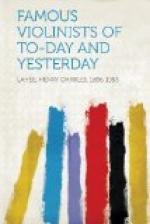Lipinski declined the honour of going on a concert tour with Paganini, as he wished to return to his home. On stopping at Trieste he heard of an old man, over ninety years of age, who had once been a pupil of Tartini, and sought him out in order to “get some points” on Tartini’s style. The old man, Doctor Mazzurana, declared himself too old to play the violin, but suggested that if Lipinski would play a Tartini sonata he would tell him if his style reminded him of the great master. It did not, but Doctor Mazzurana brought out of a cupboard a volume of Tartini’s sonatas having letter-press under the music, and this Lipinski was ordered to read in a loud tone and with all possible expression. Then he had to play the sonata, and after numerous attempts and corrections, the old man began to applaud his efforts. Lipinski ever afterwards profited by these lessons.
Later on he met Paganini again at Warsaw, where they were rivals, for the time being, and different factions waxed warm over their respective merits. Paganini himself, who is said to have been asked whom he considered to be the greatest violinist, replied, with conscious modesty, “The second greatest is certainly Lipinski.”
Lipinski travelled throughout Europe, meeting with great success, until in 1839 he was appointed concert-meister at the Royal Opera in Dresden, where he remained for many years. He also organised a string quartet, and was considered a most excellent performer of chamber-music. He wrote a large quantity of music for the violin, but little of it was of a lasting quality. In 1861 he was pensioned, and retired to Urlow, near Lemberg, where he had some property, and there he died in December of the same year.
CHAPTER IV.
Paganini.
The name Paganini stands for the quintessence of eccentric genius,—one of the most remarkable types of mankind on record. Paganini was able to excite wonder and admiration by his marvellous technical skill, or to sway the emotions of his hearers by his musical genius, while his peculiar habits, eccentric doings, and weird aspect caused the superstitious to attribute his talent to the power of his Satanic Majesty. Yet Paganini was not only mortal, but in many respects a weak mortal, although the most extraordinary and the most renowned violinist of the nineteenth century.
[Illustration: Niccolo Paganini]
Nicolo Paganini was the son of a commercial broker, Antonio Paganini, and was born at Genoa, February 18, 1784. He was a child of nervous and delicate constitution, and the harsh treatment accorded to him by his father tended to accentuate and develop the peculiarities of his character. He was a good violinist at the age of six, and before he was eight years of age he had outgrown, not only his father’s instruction, but also that of one Servetto, a musician at the theatre, and that of Costa, the director of




